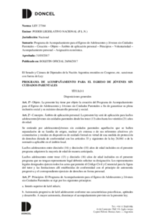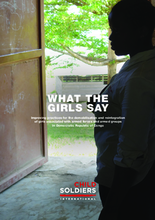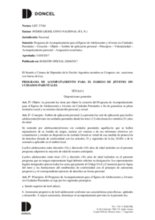Displaying 751 - 760 of 991
La presente ley tiene por objeto la creación del Programa de Acompañamiento para el Egreso de Adolescentes y Jóvenes sin Cuidados Parentales a fin de garantizar su plena inclusión social y su máximo desarrollo personal y social.
This study examines successful transitions of children from out-of-home care to young adulthood in Korea to draw implications for child welfare practice and policies.
This report presents the findings of research conducted by Child Soldiers International to assess the effectiveness of release, psychosocial recovery and reintegration interventions for girls associated with armed groups in eastern Democratic Republic of Congo (DRC).
Drawing on data from the Wales Adoption Study, this paper examines the prevalence and profiles of care leavers amongst birth parents whose children were placed for adoption.
This paper reports the findings of an Australian study that examined longitudinal data on reasons for entry to care, trajectories in care and patterns of reunification and associated factors.
This paper reports the findings from an Australian study that examined longitudinal data on reasons for entry to care, trajectories in care and patterns of reunification and associated factors.
El Senado y Cámara de Diputados de la Nación Argentina reunidos en Congreso, etc. sancionan con fuerza de Ley: Programa de Acompañamiento para el Egreso de Jóvenes sin Cuidados Parentales.
The study presented in this article analyzed the life stories of 16 care leavers in Israel.
The Bridges Transitions Framework (Bridges, 2009) implemented in this study shows some promise in smoothing foster youth reactions to change. The framework was adapted to help older youth, foster parents, and social workers look beyond the concrete goals of independent living (e.g., housing, employment). It is process-oriented and attends to the psycho-social reactions and emotions that youth experience during times of significant change.
This guide from Coram Voice in the UK provides guidance to youth leaving or aging out of the foster care system, including informing care-leavers of their rights.




